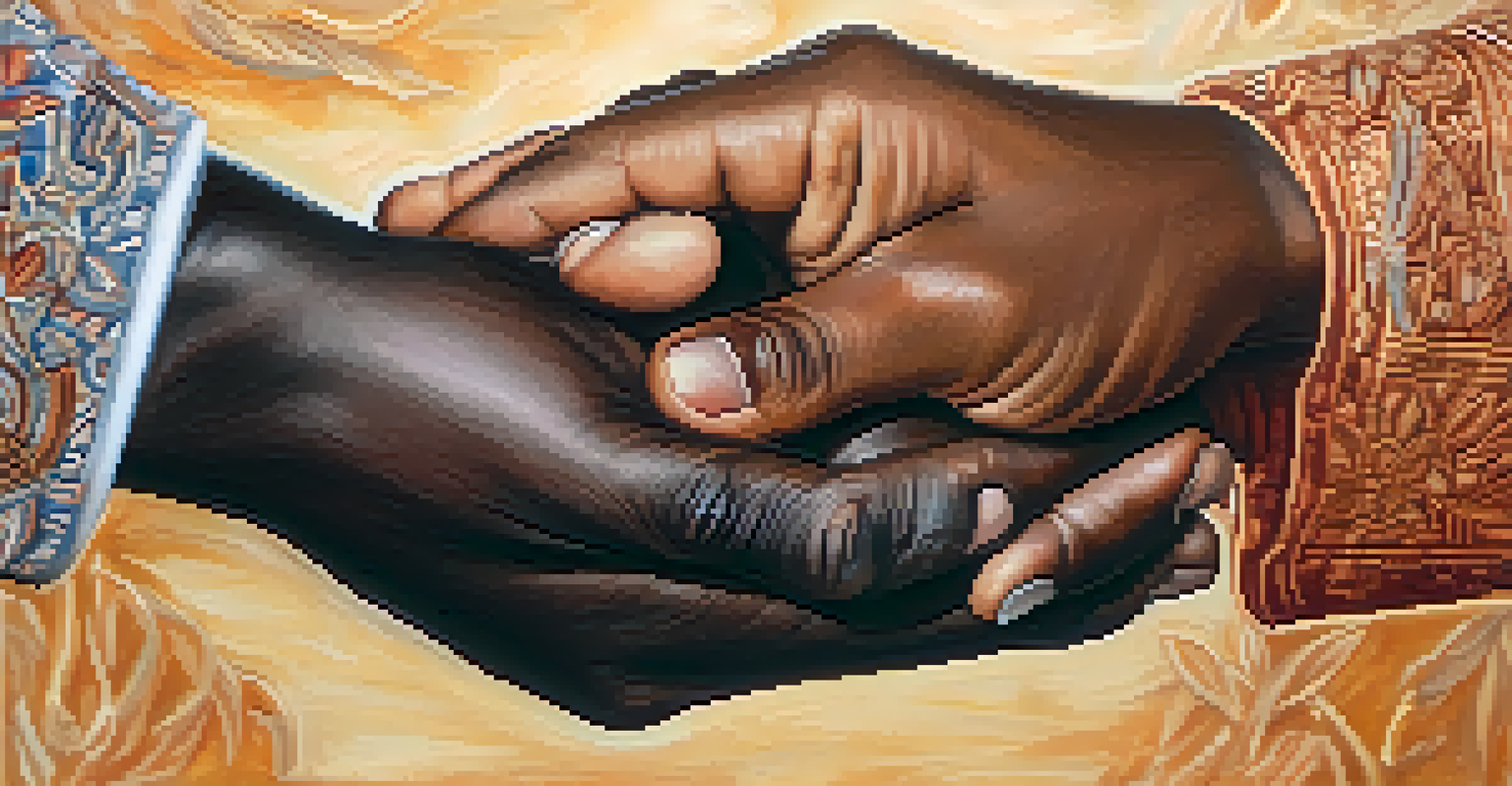Practicing Forgiveness for Emotional Healing

Understanding the Importance of Forgiveness
Forgiveness is often seen as a way to release ourselves from the grip of anger and resentment. When we hold onto grudges, it can weigh heavily on our emotional well-being, hindering our ability to move forward. By understanding why forgiveness matters, we can begin to see it as a gift we give ourselves rather than the person who hurt us.
Forgiveness is not an occasional act; it is a constant attitude.
Consider the metaphor of carrying a backpack filled with rocks; each rock represents a hurt or grievance. The heavier the backpack gets, the more difficult it becomes to walk through life. Forgiveness allows us to lighten that load, making the journey more manageable and enjoyable.
Moreover, practicing forgiveness can lead to improved mental health. Studies show that those who forgive tend to experience lower levels of anxiety and depression, allowing for a more positive outlook on life.
The Emotional Benefits of Letting Go
Letting go of negative emotions through forgiveness can be incredibly liberating. It’s like finally exhaling after holding your breath for too long; the relief is palpable. This release not only eases emotional burdens but also opens the door to healthier relationships and a more fulfilling life.

When we forgive, we create space for positive feelings such as compassion and empathy. This transformation can shift our perspective, allowing us to see the humanity in others, even those who have wronged us. It’s a step towards emotional healing that can foster deeper connections.
Forgiveness Eases Emotional Burdens
Letting go of grudges through forgiveness lightens our emotional load, enhancing our well-being.
Additionally, forgiveness can enhance our emotional resilience. By learning to forgive, we equip ourselves with the skills to navigate future conflicts more effectively, reducing the chances of harboring resentment again.
Recognizing the Barriers to Forgiveness
Despite the benefits, many find forgiveness challenging. Common barriers include pride, fear of vulnerability, and the misconception that forgiving means condoning the wrongdoing. It’s essential to recognize these barriers as they can trap us in a cycle of pain and resentment.
The weak can never forgive. Forgiveness is the attribute of the strong.
Imagine being stuck in a traffic jam, frustrated and unable to move forward. This is what holding onto grudges feels like. Acknowledging the barriers allows us to identify what’s holding us back and motivates us to seek a different route toward healing.
Recognizing these obstacles is the first step in overcoming them. By understanding what prevents us from forgiving, we empower ourselves to confront these feelings and actively work towards letting them go.
Steps to Cultivate Forgiveness
Cultivating forgiveness is a process that often begins with self-reflection. Take time to explore your feelings about the situation and the person involved. Journaling can be a helpful tool, allowing you to express your thoughts and emotions without judgment.
Next, consider the perspective of the person who hurt you. This doesn’t mean excusing their actions, but understanding their motivations can foster empathy. It’s like trying to see a painting from a different angle; this new perspective may reveal details you hadn’t noticed before.
Self-Forgiveness Fuels Personal Growth
Forgiving ourselves for past mistakes enables us to learn, grow, and cultivate compassion.
Finally, make a conscious choice to forgive. This decision doesn’t have to be grand; it can simply be a commitment to release the negative feelings attached to the situation. With time and practice, this choice can lead to profound emotional healing.
The Role of Self-Forgiveness
Self-forgiveness is just as crucial as forgiving others. We often carry guilt or shame for past mistakes, which can hinder our ability to move forward. Acknowledging these feelings and forgiving ourselves is a vital step in the healing journey.
Think of self-forgiveness as a reset button. When we allow ourselves to let go of past mistakes, we create an opportunity to learn and grow. This process can be transformative, helping us to become more compassionate towards ourselves and others.
Engaging in positive self-talk and reflecting on what we’ve learned from our experiences can facilitate self-forgiveness. By treating ourselves with the same kindness we offer to others, we nurture our emotional well-being.
Forgiveness in Action: Real-Life Examples
Real-life stories of forgiveness can serve as powerful motivators. For instance, consider the story of a mother who forgave the drunk driver that caused her child's death. Through her forgiveness, she transformed her grief into advocacy for safer driving, demonstrating that forgiveness can lead to healing and purpose.
These narratives remind us that forgiveness is not about forgetting or excusing what happened; it's about reclaiming our power and choosing to heal. They illustrate how forgiveness can inspire change, not only in ourselves but in the world around us.
Real-Life Stories Inspire Forgiveness
Hearing powerful narratives of forgiveness can motivate us to embrace healing and change in our own lives.
By sharing these experiences, we realize that we are not alone in our struggles. Hearing how others have navigated their paths to forgiveness can provide hope and encouragement on our own journey.
Embracing Forgiveness for Lasting Change
Embracing forgiveness is a journey that requires commitment and practice. It’s about continually reminding ourselves of the benefits and the freedom that comes with letting go. As we cultivate this mindset, we begin to see the world through a lens of compassion, which can create lasting change in our lives.
Imagine planting a garden; forgiveness is like the sunlight and water that helps it flourish. As we nourish our ability to forgive, we create a vibrant space for growth, healing, and connection. This garden can bloom not just for us but for those around us as well.

Ultimately, practicing forgiveness is a gift to ourselves. It allows us to break free from the chains of our past and embrace a future filled with hope, joy, and deeper relationships.